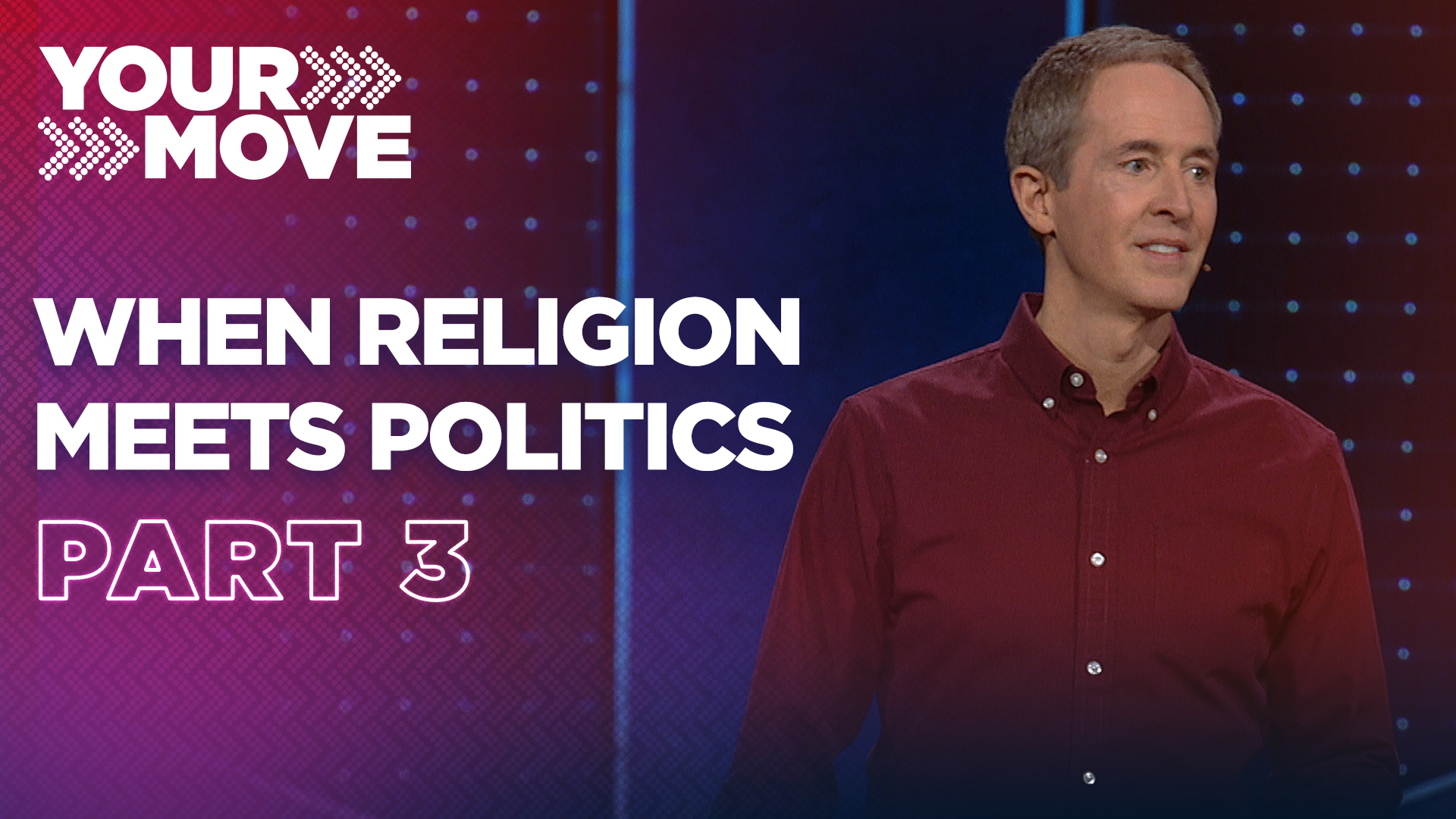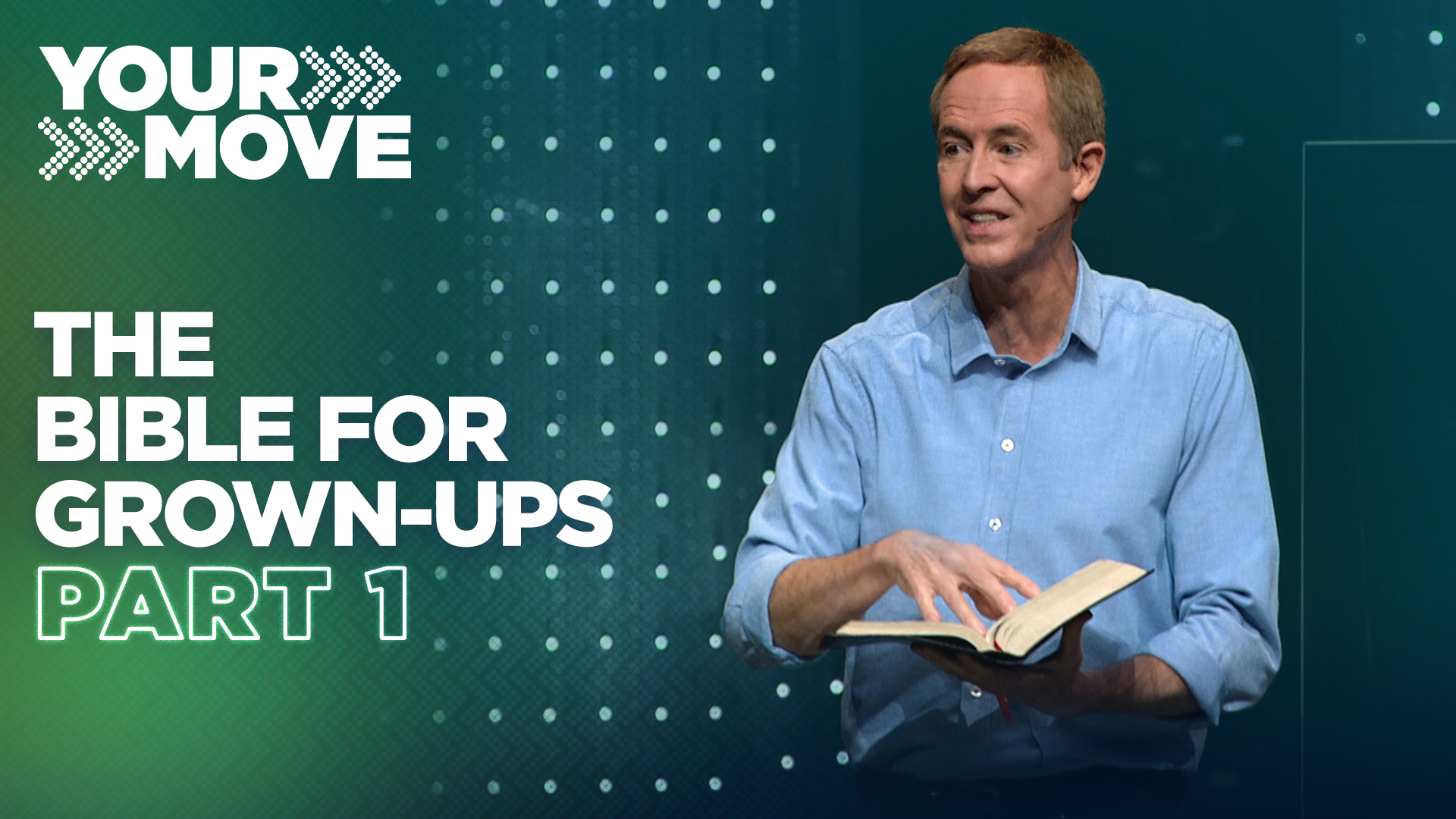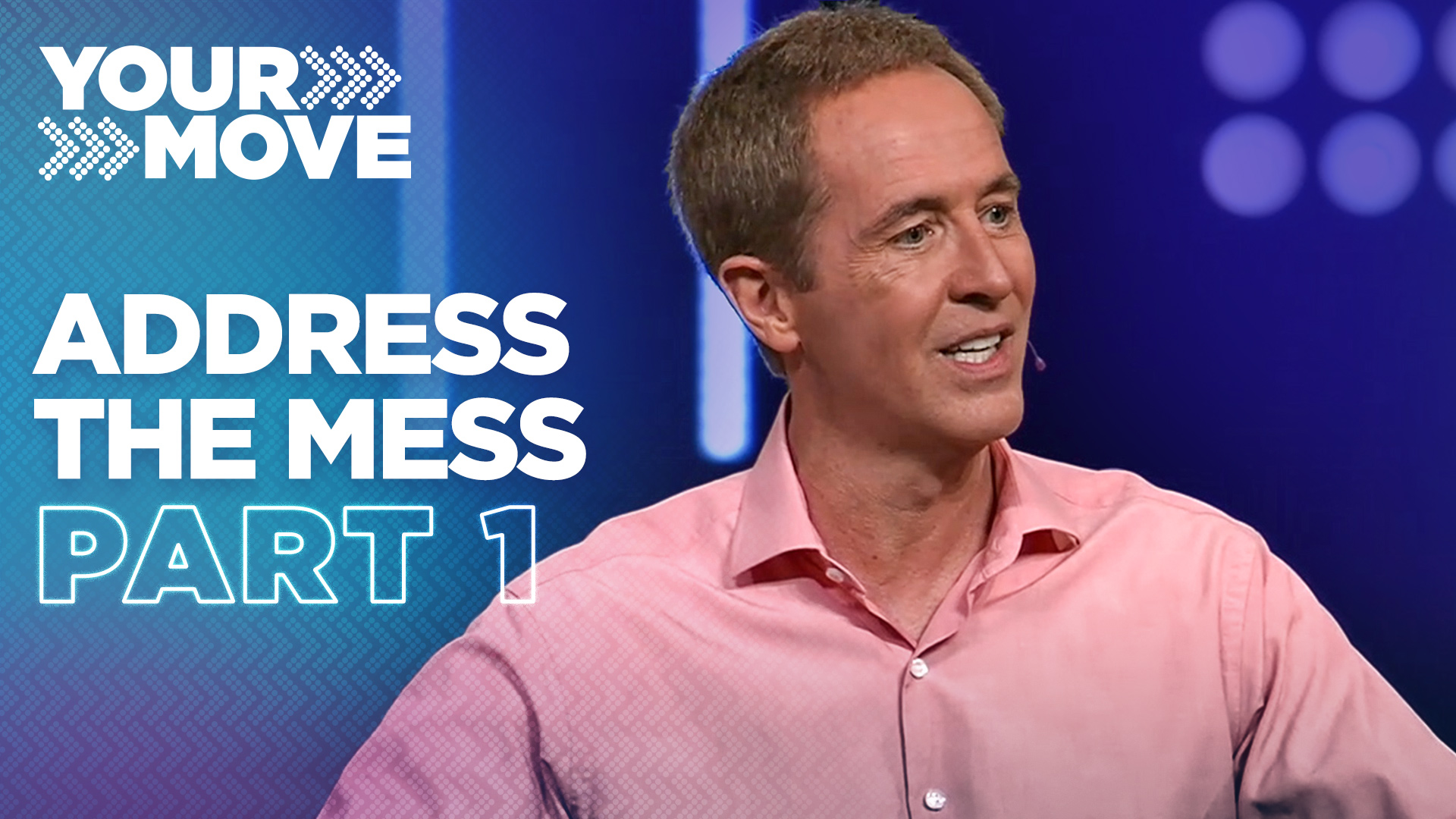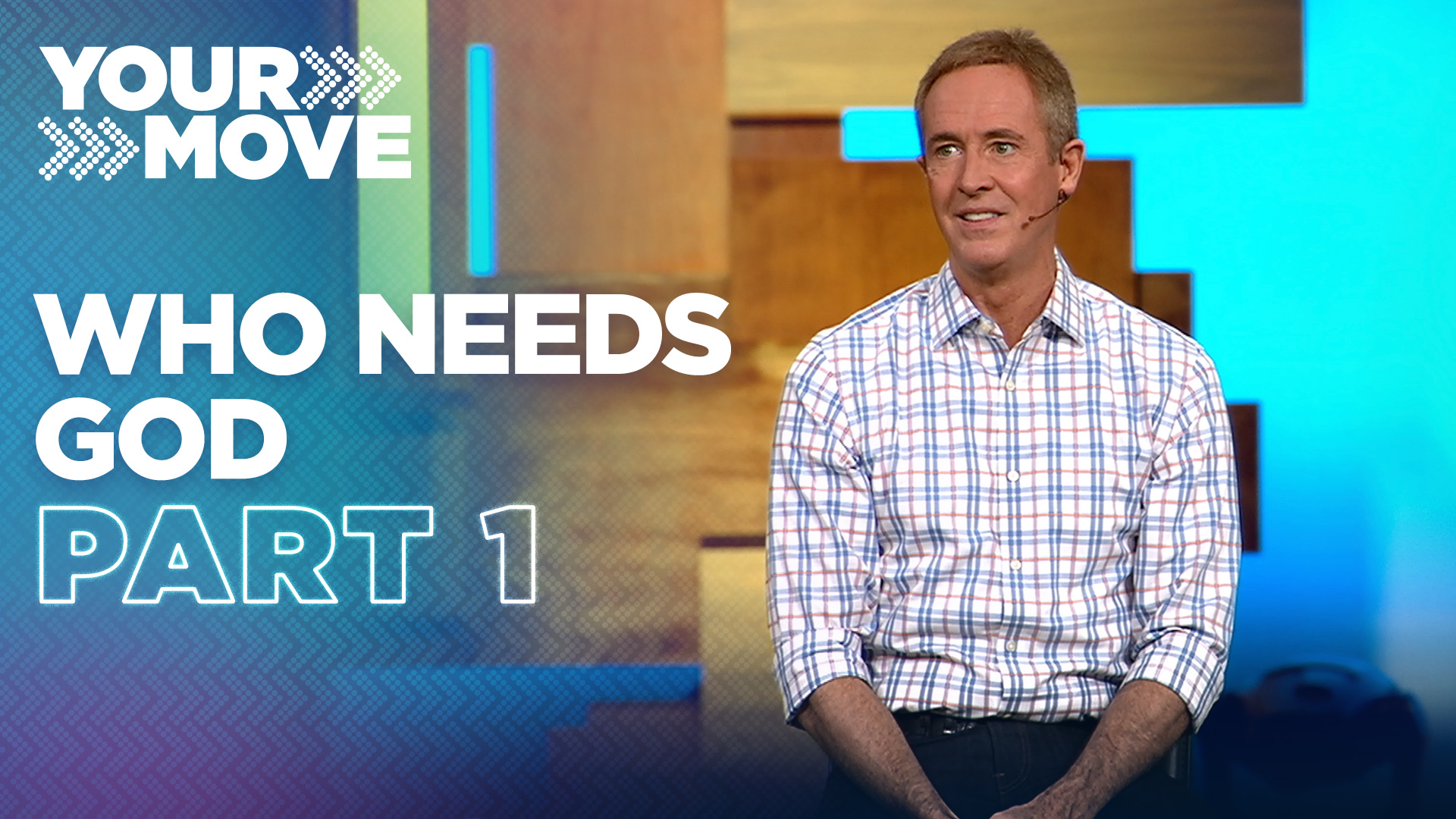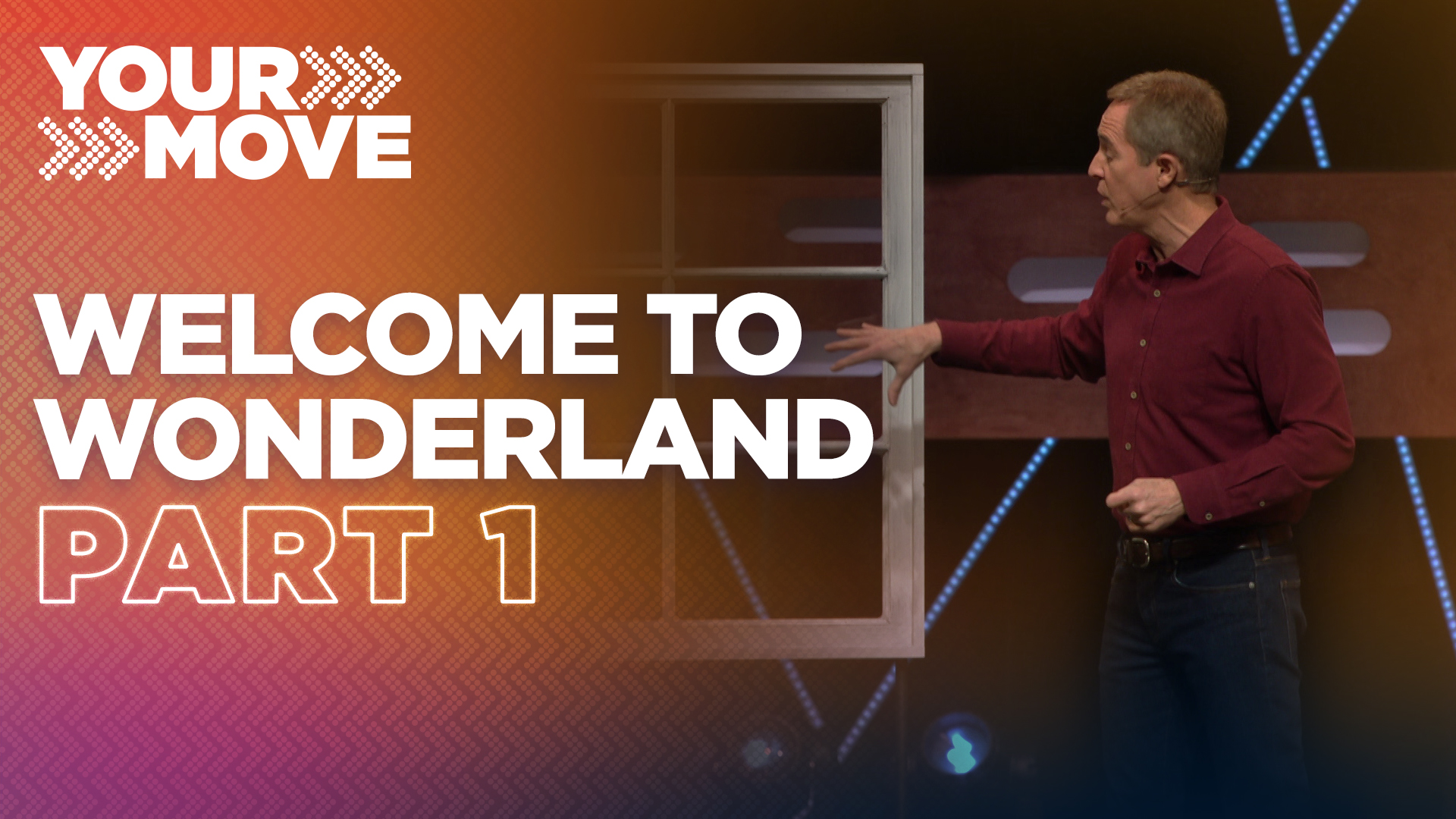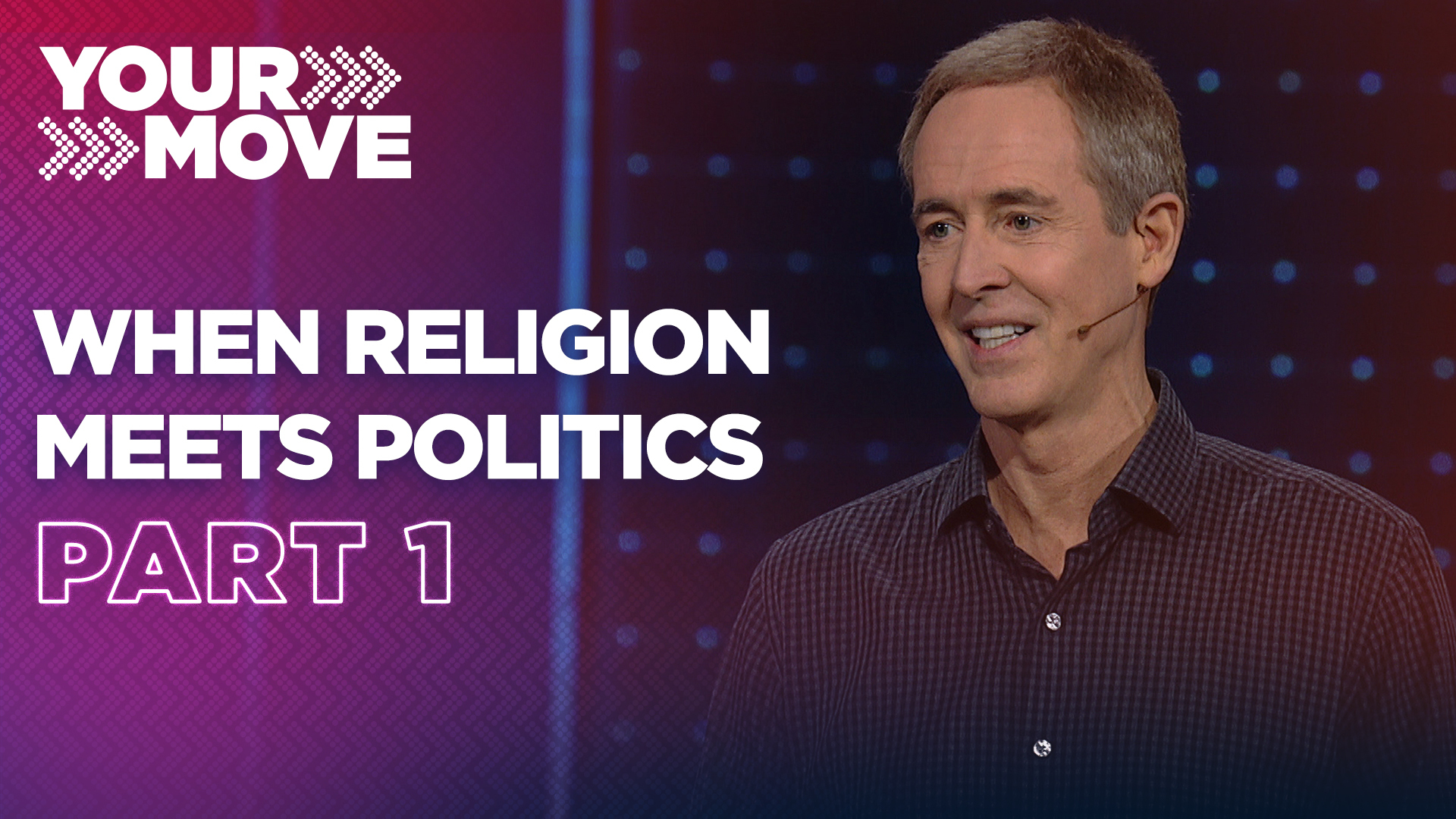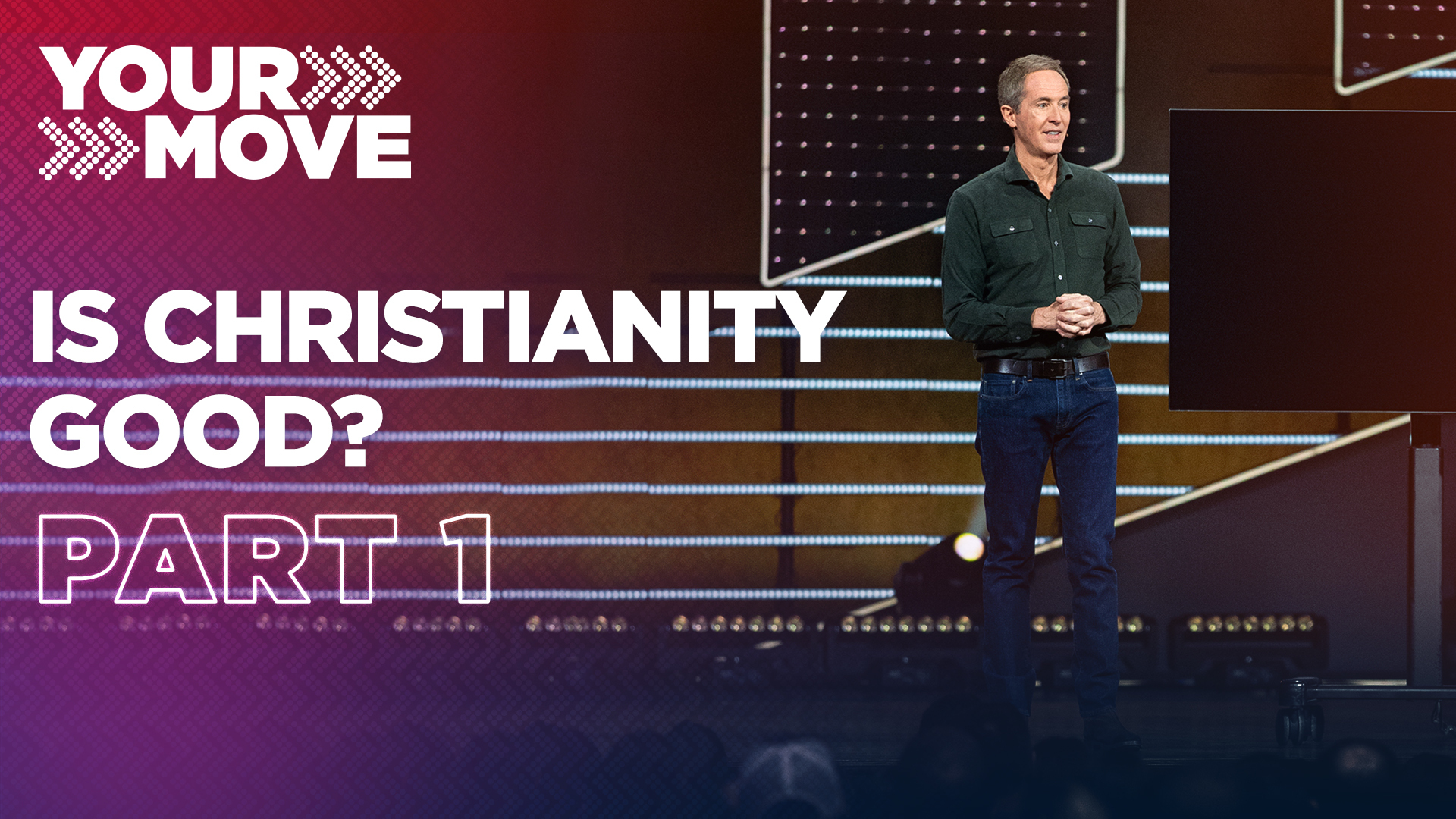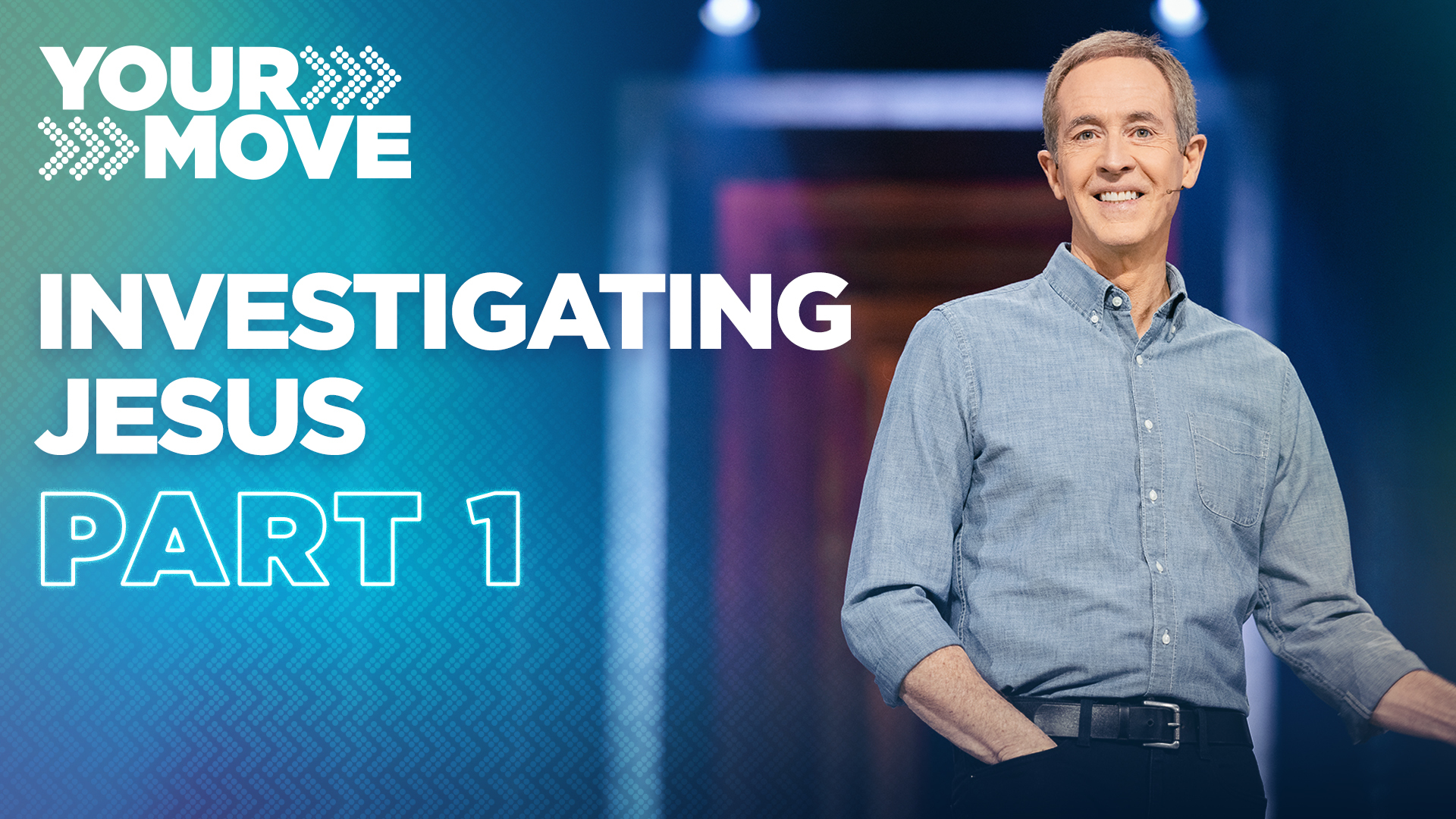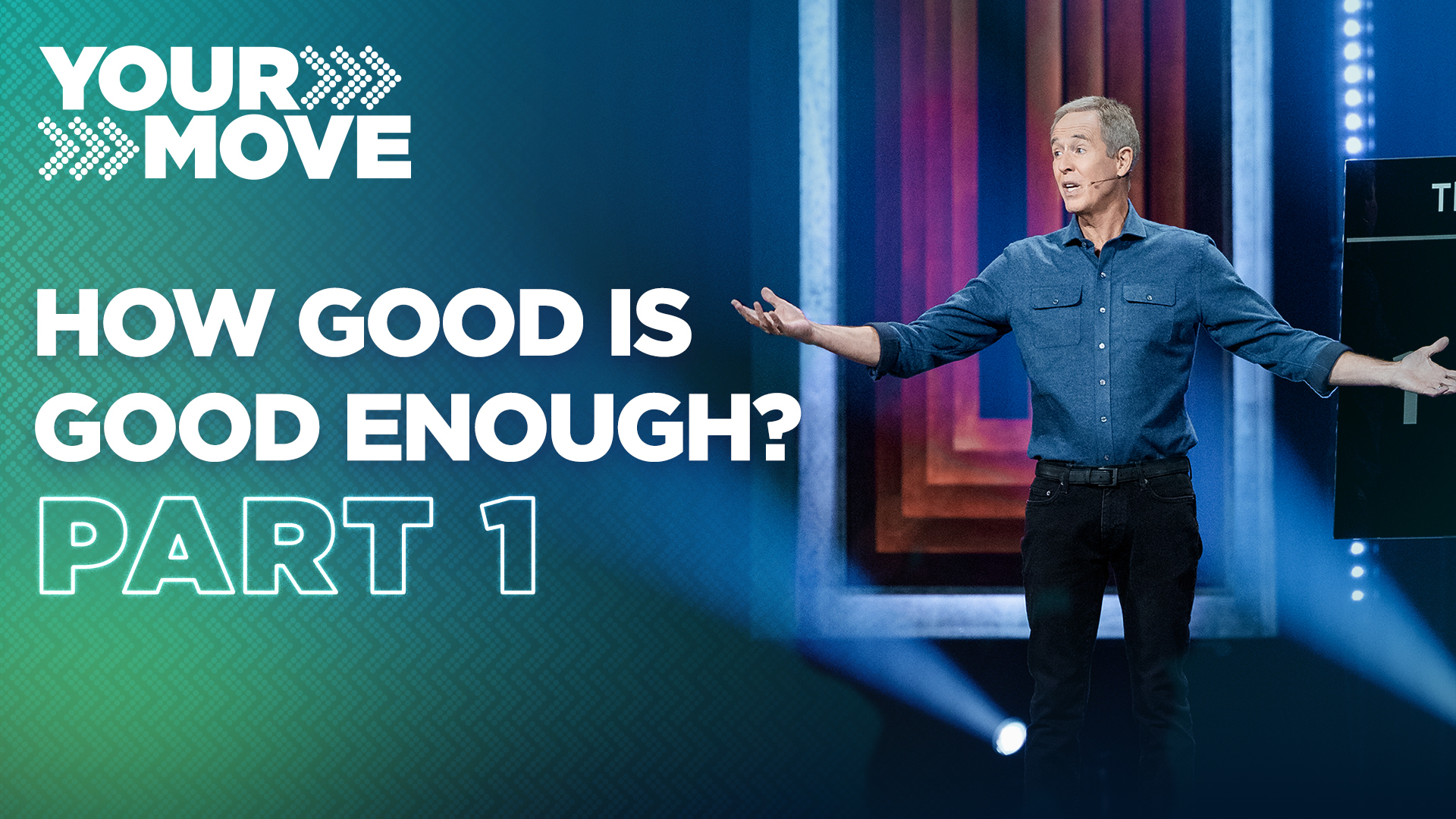Churches and faith communities aren’t immune to political divisiveness. So how, and why, should Christians from both sides of the aisle pursue unity?
- When you’re with family, do you discuss politics or avoid it? Would you like that to change one way or the other? Why or why not?
- When you’re presented with new information that doesn’t fit into your current views, how do you respond?
- Have you been guilty of burning a relational bridge over a political disagreement? Explain.
- In the words of Rufus Miles, “Where you stand depends on where you sit.” Consider someone you disagree with politically. How might their past experiences have shaped their views?
- How would you rate your ability to empathize with and understand someone else’s perspective? What could you do to improve in this area?
NOTE: The following content is a raw transcript and has not been edited for grammar, punctuation, or word usage.
Now, if you’re a Christian, here’s the tension, and this is where we left off last time we were together. And if you’re not a Christian, you get to sit on the outside and judge us to see whether or not what we do this very well. In fact, my hunch is this: If we had done better what we’re gonna talk about today, you may be more interested in the Christian faith or you may have never abandoned the Christian faith to begin with. So, listen carefully.
The tension for those of us who are Jesus-followers is this: Are we willing, or are we even able… I think that might be the better question. Are we willing to put our faith filter ahead of our political filter? Are we willing to be Christ followers first, and Republicans and Democrats and Libertarians, and whatever else you might be, second? Are we willing to follow Jesus, this is the tough one, are we willing to follow Jesus, when following Jesus creates space between us and our political party, space between us and our political platform, space… Or the platform of our political party, and space between us and our political candidate? Now, to be clear, I’m not suggesting that you not be political, I’m not suggesting that you not wade into politics, talk about politics or run for office. I think we should all lean into what’s happening in our nation. And for those of you who feel called to enter the fray, you should step right in.
But what I am suggesting is that we take what Jesus said, that we looked at last week, seriously, that we not allow the political climate to divide the church, any local church or the church in general. Because Jesus, if you’ll remember, there’s one thing Jesus prayed for more than anything else He prayed for. In fact, it was the thing He prayed for before He was crucified, was that His body, His movement, His ecclesia, would not be divided, that we would be one, that we would figure out a way, which we are, to disagree politically, because we always will, but at the same time, love unconditionally, and begin to pray for unity. Now, the interesting thing is this: In the first century, there was something they had something in common with what happens in our culture as well. In the first century, when you read the Gospels, it’s so fascinating, everybody wanted Jesus to be on their side.
And that’s true today. Both parties are convinced Jesus would be on their side if He were to walk… Come back to earth today. Republicans are absolutely convinced Jesus would be a Republican because of their values, Democrats would say, “Absolutely, Jesus would be a Democrat because of His care and His concern for people.” And so, everybody wants a piece of Jesus.
And the interesting thing is this: If I were given the assignment, “Andy, could you come up with a sermon that would demonstrate that in fact, the Republican Party and the Republican platform is in sync with the teaching of Jesus?” I could do that. And if somebody else were to come along and say, “Andy, would you create a sermon that shows that the Democrat platform and their values is in sync with the teaching of Jesus?” I could do that, too. Because when you interpret the words of Jesus, when you interpret the words of Jesus through the filter of your political… Through your political filter, it’s amazing. He’s so red, He’s so blue. It’s amazing how often He agrees with you!
[laughter]
So if you start with that filter, there’s plenty… And the truth is, both sides quote the Bible and both sides quote Jesus. The really funny thing is, both sides actually use the same verses. So the question is this: Can we put our Jesus-following filter, our faith filter ahead of our political filter? And it’s very, very difficult to do, as we’re gonna see today.
Jesus came, Jesus came to introduce the Kingdom of God to earth, the Kingdom of God values, the upside-down kingdom, where those with the wealth and the power leverage their wealth and power and resources for those that have less power, less resource. The Kingdom of God, where the King laid down His life for His subjects, rather than demanding His subjects lay down their lives for Him. The Kingdom of God that was so broad and inclusive that He said, “And everybody’s invited to participate in it.” But the Kingdom of God will always, perhaps, I think this is the case, but this is just my opinion. The Kingdom of God will always, in some detail and at some level, conflict with the kingdoms of men. And the Kingdom of God will always, at some level and some detail, conflict with your political party and the platform of your political party and our political candidates. There’s always gonna be a tension. And this is why it is absolutely foolish, it is so foolish for the church to ever be divided over a candidate or over a political party.
Because at the end of the day, no political party is probably gonna line up with the Kingdom values of Jesus, although each party has a little bit of it, even though that’s difficult for some of us to acknowledge. But again, it’s foolish for us to be divided, because we’re supposed to be Kingdom people first, and political people second, but that’s very, very difficult to do. So, here’s what I’m gonna do today. I’m gonna try to give you a little template to help us all understand where does agreement end and diverse opinions, especially diverse political opinions, begin, Alright?
So to start with, the Apostle Paul, who we talk about all the time, the Apostle Paul steps onto the pages of history, as you know, as somebody who hates Christians. He was a Pharisee, he was brilliant, super educated, becomes a Jesus-follower, and he had the distinction of being a Roman citizen. So he had all of this background, all of this stuff going on. And the Apostle Paul, in two of his letters, gives us a phrase that I think begins, gives us a great starting point for putting together this template. And he uses a phrase that perhaps you’ve never seen before, because he only uses it twice in the letters that survived antiquity. And the phrase is this, he refers to, the law of Christ, the law of Christ. Now, the law of Christ, as we’re gonna discover, was his shorthand for Jesus’ new covenant command, that we talk about all the time. When Jesus gathered with His disciples for the final Passover, He said, “Guys, I’m giving you new command. This command is gonna be a substitute for all the other commands. You had 613, you had Torah, but I’m giving you a new command, because we’re establishing a new covenant.”
And as you probably know, the new command was simple. It was: “You are to love one another,” with a caveat, “as I have loved you. This isn’t just a love fest. You are to love one another… This isn’t one-way, this is two-way. You are to love one another as I have loved you.” And then, he said this: “By this, by this unique brand of love, by this unique brand of new covenant love, everyone will know you’re my disciple, if you love one another.” So, the Apostle Paul takes that idea and he pushes it through all of his letters as the uniting ethic for all Jesus’ followers.
Here’s a couple of examples, he writes this in his letter to Christians living in Corinth. He says, “Though I am free and belong to no one, I have made myself a slave,” strong language “I have made myself a slave to everyone.” “To everyone? Why Paul?” “To win as many as possible.” Paul says, “Look, I’m on a mission. I don’t have much time left, and I did a lot of damage to the church, so I’m trying to make up for lost time. And I’m willing to do anything short of sin to convince Gentiles that God has done something on their behalf in the world.” He continues, “To those not having the law,” talking about the law of Moses, the Torah, “For those not having the law,” that’s Gentiles, “I became like one of those not having the law.” In other words, “I became a Gentile in order to reach Gentiles, even though I’m Jewish,” this is the extreme to which he’s willing to go. But then, he qualifies it. He says, “Though I am not free from the law of God.” To which a Jewish reader would say, “Wait a minute, you just said you’re not under the law, you’re not gonna act like somebody under the law, but you’re not out from underneath the law of God? What are you talking about? So, you’ve pulled out from underneath Torah, but somehow you’re still under the law of God?”
Paul’s saying, “Yeah, I’m still under God’s authority, I’m just not under Torah.” And then, he tells us what law he is under, and here’s our phrase. He says, “But I am under the law of Christ,” there it is. So, “I’m no longer under the law of Moses, but I’m still under God’s authority, because I’m under the law of Christ.” And what is the law of Christ? “You are to love one another as I have loved you.” In his letter to Christians living in the Roman province of Galatia, he says this, this is a little bit more descriptive. He says, “Carry each other’s burdens.” When you see somebody who’s burdened financially, somebody’s who’s burdened with kids, somebody’s who’s burdened with work, somebody’s who’s burdened with a physical ailment, or that has gotten tripped up in life, you are to carry one another’s… ” And again, this is an each other thing, this is a everybody’s in, this is the Body of Christ functioning like the body. “Carry each other’s burdens. And if you do,” look at this, “If you’ll do that, you are fulfilling,” and here it is again, “the law of Christ.” And what is the law of Christ? “You are to love as I have loved you. You are to love one another as I have loved you.”
So, if you have a concern for someone… Or, I could say it this way. When the concerns of others concern you, when the concerns of others concern you and you act on it, you are fulfilling the law of Christ, you are doing what Jesus told the disciples to do; and again, the New Testament marching orders for those of us who are Jesus-followers. So, here’s the thing. As Jesus-followers, all of… Of all persuasions, regardless of your political persuasion, if you’re Jesus-followers, the law of Christ, that is your marching orders, and the law of Christ should inform over time, as we grow as Christians, our conscience; that our conscience should become hard-wired into the law of Christ, so that when we do something that is in contrary to loving as Christ loved us, it should bother us, it should ding our conscience. But not just our conscience personally, it should ding our collective conscience, that we should all be, as a group, as a body, we should all be disturbed, irritated, or convicted by some of the same things.
We should all be disturbed, irritated and convicted when we see injustice. Disturbed, irritated, or convicted when we accidentally disrespect someone, or accidentally don’t give them what they deserve, or we see somebody in culture being disrespected. When we see people undermining their own future, undermining their health, undermining their relationship with their kids, undermining the integrity of their family or the integrity of society, we should be moved by that. We should be moved to action. It should bother us, it should ding our conscience. Whenever we see somebody expressing autonomy that undermines their family, autonomy that undermines the health of a community, that should bother us.
Because according to Jesus, if you wanna set policy, what’s good for people, that’s what’s good. What’s best for people, that’s what’s best. So, the law of Christ should inform our collective conscience.
Let me give you a couple of quick examples, because as simple as that is, this is a powerful, powerful, powerful dynamic. In fact, this dynamic shaped Western culture. You hear me say that all the time, but it’s absolutely true. For example, once upon a time, all over the world, everywhere in the world, every village, every town, every kingdom, it was self-evident, that some people should be owned by and controlled by other people. In fact, fourth-century BC, Aristotle, a philosopher, a Greek philosopher, and a philosopher… A Greek philosopher, was their responsibility was to make everything make sense in the world.
And so, Aristotle, here’s what he wrote. He said, “For that some should rule and others be ruled is a thing not only necessary, it’s expedient,” he’s talking about slavery. It’s not only is slavery necessary, it’s expedient. There’s just no way that the world would work without some people ruling over and controlling and dominating and owning other people. “From the hour of their birth, some are marked out for subjection, and others for rule.” The idea of doing away with slavery, it’s like, that’s not even a question, that’s like saying, “The sun’s not gonna come up,” it was just obvious. But, fourth-century AD, after Christianity had taken hold and begun to take hold of the Roman Empire, Saint Augustine, a fourth-century Christian bishop said, “No, slavery is the result of sin.” And suddenly, a brand new idea is born from this brilliant mind, in a world where there’s still… Slavery was just a permanent part of the landscape everywhere. Suddenly, it begins to dawn on Christians as early, in fact, earlier than that. But this is Augustine, he’s a famous guy, Saint Augustine. He said, “No. Slavery isn’t expedient, slavery isn’t a part of nature. Slavery is the result of sin.”
And as early as the fourth-century AD, Christians began having misgivings and began to see the discrepancy between what the scriptures say about people being made in the image and God and loving as Christ loved us, and the horror of slavery.
Jesus’ single new covenant command was so powerful, it was so ahead of its time, it was so modeled and baked in to the crucifixion and the resurrection, that it is trans-cultural and it is trans-generational. It sits at the epicenter of the Kingdom of God values. It will never go out of date, it doesn’t have a shelf life, we are forever and ever, every generation, to do for others what God through Christ has done for us.
And so, it is incumbent upon us to figure out how to be one, as Jesus prayed we would be one, in spite of our political differences. And that leads us to the third part of our template, and that’s this. The law of Christ informs our conscience, and to an informed conscience we are to incorporate knowledge and wisdom. And let me explain why this is important. One of the great advantages of the human race is we are able to collect information and pass it to the next generation.
But humanity, because of writing, writing allowed one generation to gift the next generation with everything they’ve learned, which gifted the next generation with everything they’ve learned. Consequently, every generation is smarter than the generation before, and with knowledge comes extra wisdom and extra insight. And so, as people of the 21st century, as we think about what does it look like to live out this Kingdom ethic, we should add to our informed conscience the knowledge of science, the knowledge of psychology, and the wisdom that comes with understanding how our world works, and understanding how we’re made. All of this works together. Another way of thinking about it is this: If somebody asks you where do baby comes from, your answer to that question is determined by the age of the person asking. When a four-year-old asks you don’t lie to them, but you give them an answer, you accommodate to their capacity. When a 15-year-old asks, you would say, “You should know by now.” [laughter] Okay, so if a 12-year-old… In other words, every age… If a 25-year-old is asking this question in graduate school context… In other words, we don’t lie, but we always accommodate to the capacity of the person asking. And this so fascinating.
Your Heavenly Father, our God, accommodates to the capacity of His people. So, when we look at Genesis, we see God accommodating to the capacity of an ancient, ancient, ancient pre-science, pre-Tylenol, never took a warm shower group of people. When Jesus manifests Himself, He says, “The Kingdom has come and, as the King’s son, I have come to dwell with you.” He explains God, but He explains God in a way that the Old Testament, it doesn’t quite explain God. Why? Well, people’s capacity has changed, things have changed. And in every generation, our knowledge increases, our insight increases, and God’s ability to help us understand how He made the world and how the world works increases. And as Christians… And this is a tension point. As Christians, we should be on the forefront, we should never resist science, we should never resist discovery. We should be the most curious people, because our faith is tethered, not to an interpretation of a text, our faith is tethered to an event in history, the resurrection of Jesus. So, we don’t need to fear new, and we don’t need to fear science.
And every once in a while a generation comes along that gets in a run and gun battle or a spitting match with science, and it’s so foolish. So, the knowledge and wisdom combined with an informed conscience, that is what we should use, and that’s what we should leverage to determine which policies and platform and legislation we support. Let me go through it one more time. The law of Christ, if you’re a Jesus follower, non-negotiable. An informed conscience, over time, as you learn more and more and follow Jesus longer, your conscience is gonna be shaped according to the law of Christ. Knowledge and wisdom, this is a bit intuitive. This is why when your children get sick you don’t call me, you call the doctor. Once upon a time, when the children got sick, they called the priest. But now you don’t call the priest anymore, you call the doctor. Not because you don’t believe in the healing power of God, but because we have accumulated knowledge and wisdom in terms of how the human body works. And as Christians, we don’t see any conflict between those two things.
And I’ll pray for your child, but you don’t even call for prayer for the most part, because you go to the doctor, the doctor understands how the body works, and off you go. We naturally and intuitively incorporate knowledge and wisdom into our thinking. But here’s the rub. All that is kinda, “Yeah, Andy, I knew that. I didn’t think of it in those terms, but no new information yet.” Here’s the rub. When it comes to this, when it comes to this, there will always be disagreement among Christians. And the reason we will always disagree here… And this is where we have work to do, and this is where I hope that you’ll be willing to move and that you’ll be willing to be a little bit open-minded. The reason that we will always have work to do here is this: Because where you stand depends upon where you sit. Where you stand, where you take a stand, depends upon where you sit. You may have heard this before. This is called Miles Law. It was named for Rufus Miles, who was a part of the Eisenhower, Kennedy, and the Johnson administration. And this was his statement. And to tease it out, here’s what it means.
That our cultural context, that’s where we sit. Where you live, who you’re related to, how much money you have. Your cultural context, where you sit, determines your perspective in life. It determines what you see, what you experience, how you see it and how you interpret it. And this is true for all of us. This is why, if I can push on you a little bit, this is why most of you don’t see any conflict between your faith and your politics, none at all. You are loving this series because you have some friends who need to hear it. Right?
[laughter]
Because your political views, and you know this, they weren’t shaped in a vacuum. And pausing to recognize this and pausing long enough to incorporate this into your thinking, is what it means to be mature. And, oh my goodness, do we need a little bit more maturity in the political discussion in our nation right now, right? Okay, so. Yeah, go… That was a golf clap, I know.
[APPLAUSE]
Amen. Don’t get me going, right? In fact, pausing to recognize this is the way forward, pausing to recognize this is how the extremes, if they’re mature, are willing to move toward the middle. Now understand. I’m not suggesting that we all get in the middle and we have a Kumbaya moment and we all become some new party, and we all agree on anything. Let me say it again, that fourth line that I had up here a minute ago, there’s always gonna be disagreement when it comes to policy, platform, or legislation. And that’s okay as long as we are mature enough not to allow it to divide us. And if we’re mature enough not to allow it to divide us we will be better for the conversation. It’s a step toward political unity, and it’s a step toward unity in spite of, I should say, political diversity. So political views and values, you know this, political views and values like all of your views and values are shaped by a variety of things, most of which we had or have no control over.
And if we can acknowledge this and take a deep breath, we all learn something. And we don’t change what we believe, but we gain understanding in terms of why other people act the way they do and believe the way they do and we won’t experience division. Here’s some of the things that impact the way you think and believe politically. Where we live, how we were raised, where we were educated, if we were educated, what we’ve been told, what we’ve seen, what we’ve experienced, and what we’ve seen others experience. These are the factors, and these are just a few. These are the dynamics that shape our political viewpoint. Perhaps the best evidence of this is if you think about your parents’ political viewpoints. If I were to say to you, “Why do you think your dad was a Republican? Why do you think your mom was just absolutely committed to be a Democrat… Why?” You would have an answer, and you would relate it not so much necessarily to their theology, but to the world they grew up in. And the same is true for you, and the same is true for me. And that doesn’t mean that we have dismissed the significance of our faith, not at all. It’s that when these two things come together, we have a tendency to use one to prop up the other. We all do.
But what if, what if, especially over these next few months, we were able to step back and begin to view it just a little bit differently? Not change what you believe or who you vote for, but to just see it a little bit differently. Again, because where you stand depends on where you sit. And recognizing this allows us to open our hands and open our minds and open our hearts without changing our political viewpoint. But beware, when you start down this road, you may change some of what you think and even some of what you believe. But that’s not the goal, that’s just an unintended consequence or an unintended outcome. So putting it all together, here’s what it looks like. Law of Christ, informed conscience, knowledge and wisdom, policy, platform, and legislation. Now, that’s not dynamic, that’s just kind of an is. So I wanna spend the next four-and-a-half minutes making a suggestion in terms of what we do with this and what we do about this.
Three things, so simple. Begin to listen, listen, and specifically listen to people who don’t experience the world the way you do. Listen to people who don’t experience the world the way you do. Not just the haves and the have-nots, the Christians and the not Christians, young and old, Black and White, gay and straight, married and single, new citizens, old citizens, people who’ve been in the military, people who despise the military. Begin to listen to people who have experienced the world differently than the way you have. And number two, once you start listening, learn something. Okay? Don’t just, “Well, I listened, but I’m not gonna think… ” No, learn. Listen, come on.
Be a student, not just a critic. You’re an amazing critic without one single lesson, [laughter] amazing, you’re just an amazing critic, right? Some of you mute the television, so you can do your own commentary to your family. They love that. It’s like, “Dad, thank you. We know what you think. Could you turn the volume back up?” Right? I mean we love it. But would you, would you pause and would you become a student, not just a critic. Otherwise… Can I push at you a little bit? Otherwise, you’re gonna discount every bit of information, you’re gonna discount anything that doesn’t fit perfectly in your current flawed world view. If you don’t listen and you don’t learn, if we don’t listen to each other and learn from each other, we will discount anything that doesn’t fit perfectly within our flawed worldview. And we quit learning.
And as long as we catch ourselves saying, “I don’t know how anybody could believe that.” You’ve just confessed something about you, not them. “I don’t know how anybody could believe that.” Well, then Andy, you don’t know something. Learn it. I don’t know why anybody would react that way. Well, there’s something I don’t understand. So, why wouldn’t we, especially within the Body of Christ, take time to understand? Because everybody’s behavior makes perfect sense to them. Everybody’s response makes perfect sense to them. Everybody’s viewpoint, [chuckle] everybody’s politics makes perfect sense to them. And when we don’t understand, it’s because we don’t understand. In fact, if you’re a Republican, you need to know that the Democrats are really just like you. And if you’re a Democrat, you need to know the Republicans are just like you. They’re taking a stand based upon where they sit.
Last thing. Third “L” word, love. Never, please, never, ever, ever burn a relational bridge over a political view. Never, ever, ever burn a… Well, you say, “Well, they started the fire.” Okay, well, they started the fire on their end of the bridge, don’t start a fire on your end of the bridge. Never burn a bridge, a relational bridge, over a political view because, this goes back to Jesus’ commandment, this goes back to the cross, this goes back to the epicenter of what we believe as Christians. The you beside you is more precious to God than your potentially flawed view, a view that you changed 10 years ago, a view that you’re gonna change five years from now. Do not burn a relational bridge over a political view. The you beside you is more precious to God than your potentially flawed view. While you and the person you’re burning the bridge down with, while both of you were yet sinners Christ died for both of you. How dare I, how dare I burn down a relational bridge with someone for whom Christ died?
And how dare you do the same thing if you’re a Jesus follower? So come on, let’s listen, learn, and love. And again, like I said last week, I know you can’t help but think this: “Andy, this is so naive. Do you really think that’s gonna make any difference?” You just remember this, once upon a time there were a handful of Jesus followers crushed between an empire and the temple. And they gave to Caesar what was Caesar’s, and they gave to God what was God’s, their lives. And now the empire is no more. The temple is no more. Rome’s most famous emperor is nothing but a footnote in the story of Jesus of Nazareth. Kingdoms come, kingdoms go. Empires rise, empires fall. Jesus said, “I’m gonna build my ecclesia and nothing is ever going to stop it.” And he did, and we’ve been invited to be part of it. And it is still the way forward. And our responsibility, especially in a season like this, is to show our divided nation and our divided world what it looks like and that it’s even possible to disagree politically, to love unconditionally, while we pray for unity. Because at Calvary, at Calvary, at the cross, we lost our right to do anything less than that.


